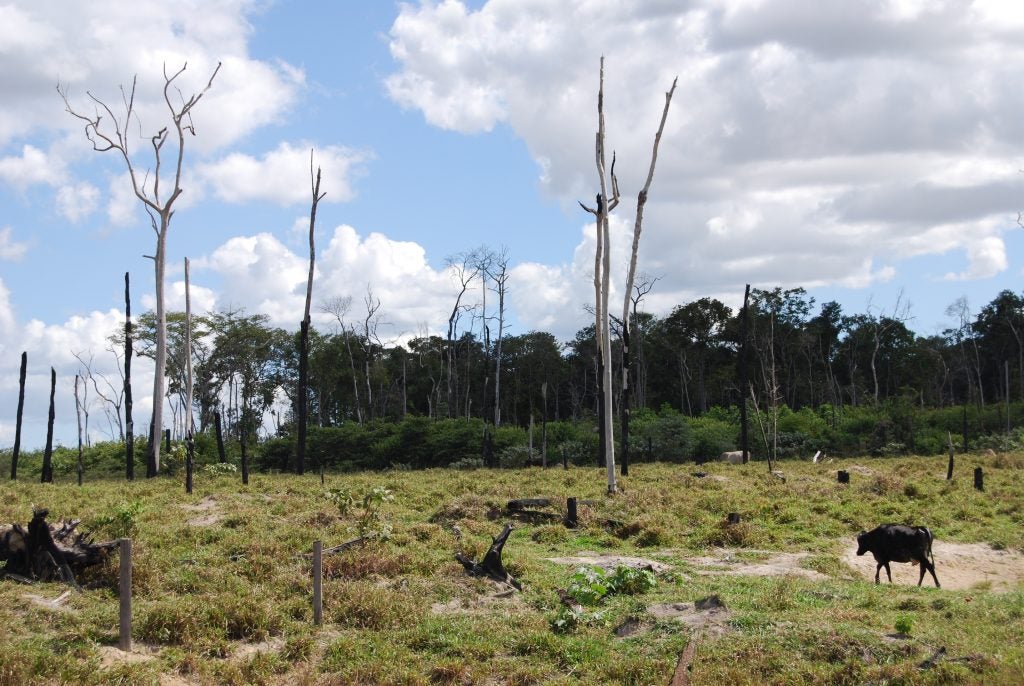
Cattle grazing at a ranch where burned trees and the edge of the rainforest are still visible in Brazil. Shutterstock.
Jair Bolsonaro, the winner of Brazil’s presidential election, has been dubbed “Tropical Trump.” The parallels are strong – both Bolsonaro and US President Donald Trump show clear contempt for democratic institutions, are on the record with racist and misogynist statements, and play on and inflame the fears and hatred of their supporters.
They are also both dangerous to the planet.
Both think they can put up a wall around their countries, ignore or affront the rest of the world, and stoke up their national economies with no regard whatsoever for the environment. Both believe that solving climate change would impede the ability to profit from exploiting natural resources.
This bedrock “me-first” provincialism isn’t just based on generic ignorance. It ignores the fact that we all share a single planet and increasingly, things that happen in one place affect other places – ecologically and economically.
Carbon pollution from coal-fired power plants in the United States is contributing to rising temperatures and extreme droughts and floods in the Amazon. Deforestation in the Amazon pours carbon into everyone’s atmosphere and changes rainfall regimes globally.
Pretending that unsustainable economic growth is all benefit and no cost – or that the shift to sustainability is all cost and no benefit – is a recipe for ecological disaster and economic ruin. With his anti-environment platform, Bolsonaro could take Brazil in this direction.
Bolsonaro could take Brazil in the direction of ecological disaster and economic ruin.
Brazil’s environmental challenges
Bolsonaro has said he’ll close the environment ministry, subordinate federal environmental agencies to the agriculture ministry (controlled by agribusiness), and open up indigenous territories to mining and agriculture. Modeling predicts that these actions would triple current deforestation rates, to a thundering 25,000 km² a year.
Climate and forest scientists have long known that the Amazon produces about half of the rain that falls in the region, by cycling water from the soil through the trees and back to the atmosphere. Scientists have also long understood that climate change, deforestation and widespread use of fire to remove forest combine to make forests hotter and more fire-prone.
Beyond a certain “tipping point” in the Amazon, these large-scale transformations will turn rainforests into savanna and release massive amounts of carbon emissions. (Leading scientists estimate the tipping point will occur when 20% to 25% of the Amazon has been deforested; right now, that number is at 19%.) Savannization of southern and eastern Amazon would affect rainfall – and agriculture – in southern Brazil as well as the Amazon itself, as well as the reservoirs supplying São Paulo and Brasília, already subject to alarming droughts.
International and economic isolation
Bolsonaro has floated, and then walked back, the idea of withdrawing Brazil from the Paris Agreement. Leaving the Paris Agreement would isolate Brazil, and not only diplomatically. French President Emanuel Macron has suggested that countries not in the Paris Agreement be excluded from trade agreements. It could jeopardize trade talks between the European Union and Mercosur, a South American trade bloc.
Slash-and-burn policy in the Amazon will also shut Brazil out of important emerging environmental markets – including new carbon and biofuels markets under the Paris Agreement, and the International Civil Aviation Organization.
Some of the world’s biggest commodity traders and retailers have committed to zero deforestation supply chains, responding to consumer demand. Returning to massive deforestation could come back to bite Brazilian agriculture in the pocketbook.
Glimmer of hope
In the absence of federal leadership, companies with deforestation-free supply chain commitments can continue leading efforts to fight deforestation and engage in sustainable agriculture, proving that economic growth and thriving forests can go hand-in-hand.
Additionally, Bolsonaro and people around him are already signaling that he could walk back over-the-top anti-environmental threats. It will be a very good thing for Brazil, and the planet, if some of those people turn out to be less provincial than Bolsonaro. But, just as in the United States, we can expect a long, hard defensive fight.
EDF will continue to stand with our partners in the Amazon, nationally and internationally to defend the rainforests and its peoples, and combat climate change.









